#escapethroughthepages
Photo
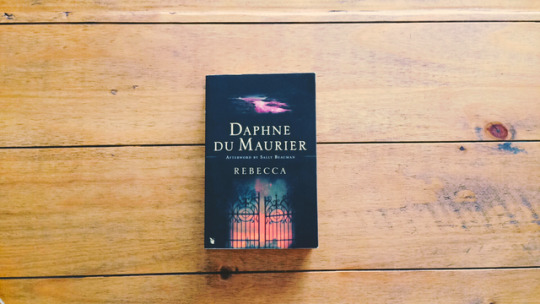
R E V I E W - Rebecca by Daphne du Maurier
Working as a lady’s companion, the heroine of Rebecca learns her place. Her future looks bleak until, on a trip to the South of France, she meets Max de Winter, a handsome widower whose sudden proposal of marriage takes her by surprise. She accepts, but whisked away from glamorous Monte Carlo to the ominous and brooding Manderley, the new Mrs de Winters finds Max a changed man. And the memory of his dead wife Rebecca is forever kept alive by the forbidding housekeeper, Mrs Danvers...
Another day, another attempt to articulate my thoughts about another book I’ve recently read. This time, it’s Daphne du Maurier’s thriller Rebecca. This book I was introduced to during my A levels, when our teacher recommended it as a potential book we could write our coursework on. Whilst the book did not appeal to me as a coursework text, I knew I wanted to read it. Fast forward four years and I eventually get down to doing just that.
Now I am a complete sucker for anything that falls under the Gothic; I just always ending up loving it so much. And my mum, she is a sucker for the film version of Rebecca. In fact, she has seen multiple film and television adaptations of it and though I cannot say which one is the ultimate favourite, I can say she continues to be shocked that I have yet to watch any film version myself. It’s on the to do list so one it will happen, but until then mum will just have to be content with me seeking her out to discuss the book as opposed to the film, though going by all our conversations there is very little difference. Adaptations seem to stay pretty loyal to the book and her response was always “wait until you see what happens next”, she was quite a significant driving factor in my need to finish this novel.
Admittedly, I had a slight reading slump when I started this, it took me a while to invest in the story. This book got to spend a ridiculous amount of time sat on the bedside table. But once the story got me I finished it within a day. The slowness wasn’t a fault of the book, more my brain needing a slight break after three years of intense reading at university. If anything, the fact that I still managed to get so immersed in the novel probably highlights even more just how good this book is.
The story is written in flashback mode. You travel back with the narrator to Monte Carlo and watch her fast-paced romance blossom with Max de Winter, which accumulates in a quick marriage and a return to the family mansion, Manderley. I personally liked the use of a giant flashback because it enabled the novel to start on a strikingly ominous note, which really helped to retain my attention at the start. However, there were points where I found it to be more frustrating and ever so slightly pointless. Despite the story being written in hindsight, this does not seem to be fully utilised in the story. We’re no more informed than if the narrator was telling the events at the moment of occurrence. I expected to see two different versions of the narrator; the one telling the story and the one living it, yet in Rebecca I did not find this distinction to be clearly established. I’ll admit this isn’t really a major issue, it’s just a disruption of my expectations, but in my mind this form of narration indicates the lack of character progression in the novel.
Now, I love this story, but I really do dislike all the characters. Except Frank. Frank, I love. The story is compelling, but all the characters (minus Frank) irritate me. Fortunately, it’s pretty clear we are not meant to concern ourselves with liking them. Loving the story and hating all but one character seems to be a requirement for me loving a book, as I have the same opinion of The Great Gatsby, which has come through to be one of my all-time faves. The characters are all extremely flawed, and it is through these flaws the narrative is constructed. Mrs Danvers’ obsession, Rebecca’s dominance, Mrs de Winters’ passivity and Max’s striving for perfection all combined to create some of the most unappealing individuals, and the most appealing story. Mrs Danver’s is one of the creepiest characters I have ever encountered. Her infatuation is reminiscent of Gatsby’s unfulfilled nostalgic yearning in The Great Gatsby; she never lets the new Mrs de Winter forget the romanticised glamour of Manderley when Rebecca was in charge. Right from the start she sets up Mrs de Winter to fall.
In fact, it is the ghostly aspect of the novel that largely appealed to me. And not in the typical ghost apparition way, but the design of the characters. This story has a very bleak outlook on humanity, and this is very much visible in the discouragement of individuality, especially in the line of duty. Tradition is key, and the toxic nature of it is definitely explored. The new Mrs de Winter can largely be defined as being everything Rebecca is not; she is defined by her absence. This use of polarisation in the novel is probably what helped me relate to it so much, our roles in society hold so much influence over our growth as individuals, it can be really hard to not compare to those who, publicly at least, seem to have it all together. Even though Mrs de Winter resents Rebecca, there is always a part of her that will envy her. And it is that capture of the contradictory nature of humanity that, for me, makes this novel one that deserves to be read.
#Rebecca#Daphne du Maurier#book review#escapethroughthepages#thriller#recommended read#modern classic
3 notes
·
View notes
Text
My new book blog! Go and look!
Follow if you like it and it applies to you!
2 notes
·
View notes
Photo

New week, new glasses 👓 I'm finally getting a post-uni routine going so with any luck I'll finally update the blog this week with a review 🙌
#littleupdate#booklover#bookaddict#allaboutthatlitlife#bookish#bookstagram#bibliophile#bookworm#escapethroughthepages
3 notes
·
View notes
Photo
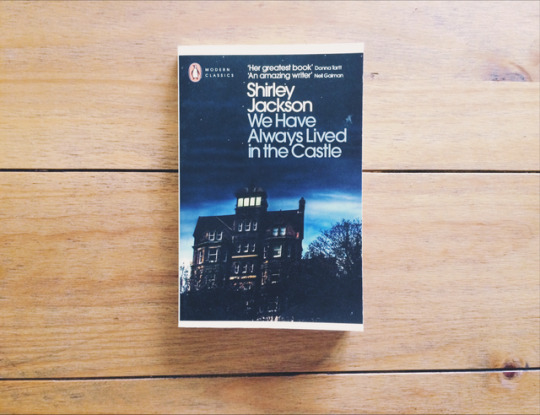
R E V I E W
Living in the Blackwood family home with her only sister Constance and her Uncle Julian for company, Merricat just wants to preserve their delicate way of life. But ever since Constance was acquitted of murdering the rest of the family, the world isn’t leaving the Blackwoods alone. And when Cousin Charles arrives, armed with overtures of friendship and a desperate need to get into the safe, Merricat must do everything in her power to protect the remaining family.
Hello friends, it has been a while. Safe to say I have been consumed by the demands of my degree this year. Recreational reading ended up taking a temporary back seat. HOWEVER, I have at last handed in my final assignments so my undergraduate degree is complete! My course friend and myself celebrated both with a cheeky cocktail, and a little visit to the book shop. Because how else do you commemorate three years of intense academic reading than by buying a book to read? We Have Always Lived in the Castle was the book I picked off the shelf.
Warning: slight spoilers underneath
I have wanted to read this story for quite a while, I love novels that fall under the Gothic and it was for this gothic influence that the novel was first recommended.
The story is set around the lives of the surviving members of the Blackwood family; narrator Mary Katherine ‘Merricat’, her older sister Constance, and Uncle Julian. The story takes place after the mass-murder of the Blackwood family several years ago, when arsenic was placed in the sugar bowl at a family dinner. Constance, having been in charge of the dinner, was initially labelled as her family’s killer, but was later acquitted. Despite being exonerated Constance, and the remaining Blackwood family, experiences rejection from the local townspeople.
The Blackwood sisters are happy to exist within the confines of their family estate, with Merricat venturing out once a week to town to get the groceries and visit the library for the household. The conflict starts when cousin Charles Blackwood comes to stay and disrupts the routine that has been in place for so long. Merricat, reliant on her routine, is unable to accept the changes that are brought by Charles’ arrival, the changes being depicted as increasingly more drastic, from the disturbance of Mr Blackwood’s bedroom to the vast destruction of the Blackwood mansion.
When you read this story, you feel it should be a lot longer than it actually is. So much action is packed into so few pages. There is never a pause in the narrative, if there is a moment of tranquillity in the household the action is then occurring in Merricat’s mind, where her paranoia is always cooking up conspiracies and ways to protect her family from the outside world. A lot of Merricat’s daily chores revolve around her need to follow rituals and find talismans she can then bury in various spots on the estate, an act that is normalised by the narrative and only questioned by both Constance and the reader when Charles finds out about Merricat’s practices. The supernatural is one of my favourite traits of the gothic, and I love Jackson’s use of it here. Merricat, to me, is a contemporary witch and her power is shown to be both subtle and intimidating. She leaves this story as the winner and definitely a character I never want to go up against. Although she is presented as an innocent youth for most of this novel, Jackson’s reveal of Merricat’s history is, for me, the most haunting moment of the book. She is both childhood innocence and amoral temptation combined. Just like Macbeth she ‘looks like the innocent flower, but be the serpent under’t’.
Despite being a novel of questionable morality and ugliness, I cannot deny there is also a lot of beauty. By isolating the family on their estate, a lot of the story interacts with nature more than an urban setting. Nature, by itself, is shown to be pure and innocent, it is only when it’s in the hands of society that its deadly potential is realised. The ugliness of the story is dominated by the horrific and cruel behaviour of humanity. The scene I found most disturbing in this novel was probably the destruction of the Blackwood manor, because it was a moment that could have been avoided, but was also a scene that the story was inevitably building towards. Here, we witness a form of collective, raw primitivism by the townspeople as they loot and ravage what was once the home of a great dynasty. They are corrupted by their anger and overwhelmed by it, and it was this loss of control that most disturbed me, because for me it was the most realistic moment. And to have that happen to your family home would be a truly horrific nightmare-reality. And to have a scene that influences me to sympathise, and vicitimise, a character such as Merricat is not only a clever scene, but one that really does fulfil the horror of the novel.
Basically, I am really glad this was the book I picked up, that this was the first book I got to leisurely read after my degree. It’s definitely a book I want to explore in more depth one day, there is just so much to it that I feel it is a book you could read over and over and never be bored. Also, the prose is just so snazzy; it’s simplistic but with a kind of lyrical quality that makes it not only easy to read, but hard to put down. Definitely a story I will always recommend.
#We Have Always Lived in the Castle#Shirley Jackson#book review#escapethroughthepages#horror#dark comedy#recommended read#classic literature#disturbing#novella
2 notes
·
View notes
Photo
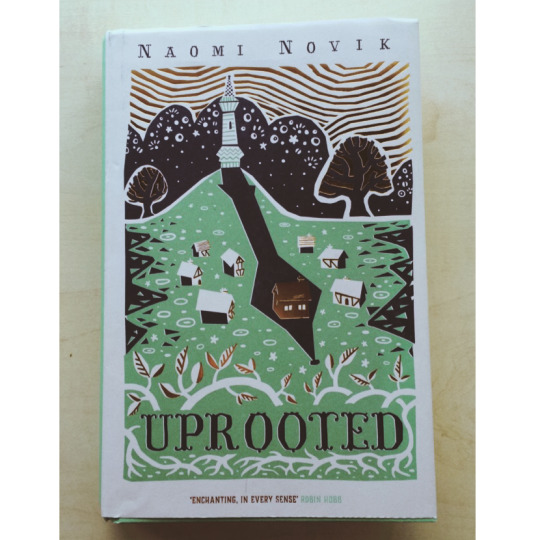
This was definitely a book worth reading, even if I did have to put it on pause for a couple months because of exams. Took a little while to get back into the rhythm of the story but it still managed to become my favourite read of the year so far!
1 note
·
View note
Photo

R E V I E W
‘R’ is a zombie. He has no name, no memories and no pulse, but he has dreams. He is a little different from his fellow Dead. Amongst the ruins of an abandoned city, R meets a girl. Her name is Julie and she is the opposite of everything he knows – warm and bright and very much alive, she is a blast of colour in a dreary grey landscape. For reasons he can’t understand, R chooses to save Julie instead of eating her, and a tense yet strangely tender relationship begins.
This has never happened before. It breaks the rules and defies logic, but R is no longer content with life in the grave. He wants to breathe again, he wants to live, and Julie wants to help him. But their grim, rotting world won’t be changed without a fight...
Warning: Spoilers
Warm Bodies is a story set in a post-apocalyptic world where the greed and strife of humanity has caused it’s downfall into darkness. The ‘plague’ was the last act to restrict civilisation and ever since humanity has survived in little pockets of societies throughout the world. This ‘plague’ caused those dead individuals to be resuscitated as members of the undead, individuals such as R and M.
R is one of the most endearing people I’ve ever met alone fictional character, let alone fictional undead zombie character! With every page I found myself loving him more and more. When we meet R we witness him fighting an internal battle between his final grasp on his humanity and his undead primal instincts. All he remembers of his previous life is that his name began with an ‘R’, the rest he guesses through his clothing. Yet as the pages turn we as the reader are privileged to witness R regain his humanity. Through meeting Julie R is able to cling to life and gradually change again. I really enjoyed watching his character development throughout the story. He starts out as quite a liminal character; he is neither dead nor alive and is very accepting of this stance. He doesn’t truly interact, everything just happens to him such as marriage, kids. He is lacking a spark. This spark is introduced via Julie and eventually grows into a passion or determination to live. I loved this idea of regeneration and hope for the future, it really made me think of the poetry by Wallace Stevens, who compared to other modernist poets always seemed to maintain a more optimistic view for the future (excuse me while I briefly draw on university teachings). Plus, it’s the start of a new year, another time for rebirth and ambition, I think I timed the reading of this novel quite nicely; and not just in terms of the new year.
You do get some of the cliché tropes attached to zombie fiction, there is gore, groaning, moaning, and an inevitable yearning for brains. But there’s always a little twist, I never fully understood the theory or reasoning for the undead’s love of the brain, but I loved Marion’s explanation. It not only fits in with the big overarching metaphor this novel seems to embody, but it actually made me sympathise for the undead as a collective, and not just the ones indicated such as R. They just want to feel something! Some of the passion that is purely linked to living human beings, that little spark. Basically through the use of zombies we are encouraged to look closer at what makes us human, and it turns out are it’s a lot more than a physical body.
So the characters are beautiful, their development is beautiful, the storyline is beautiful, the writing is beautiful and knowing that a sequel is coming out is very beautiful indeed. I just knew the story would be good but I never expected it to be what it is. And what it is, is a pretty heart-warming story.
5/5
1 note
·
View note
Quote
I think now that if all eight billion of us had just shut off the lights and gone to bed that night and left it alone we'd have all slept and the chalice would have passed us by. But let's be real. Whoever leaves anything alone? Life's a scab, and it's our nature to pick at it until it bleeds.
Nod, Adrian Barnes
#Nod#Adrian Barnes#quote#escapethroughthepages#life#sums up our self-destructive nature quite nicely
0 notes
Photo
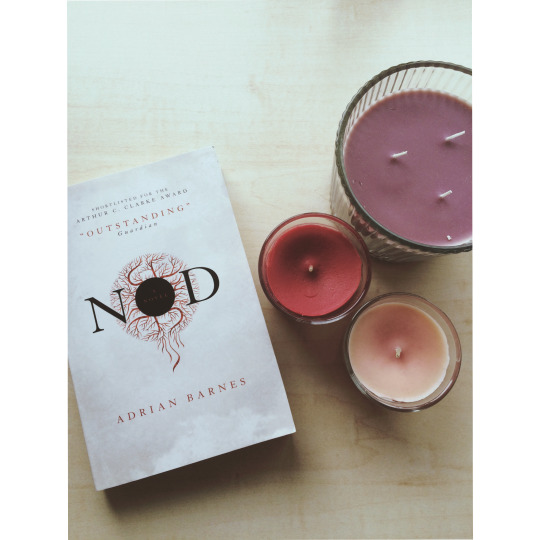
First book I’ve read for fun since finishing exams!
5 notes
·
View notes
Photo
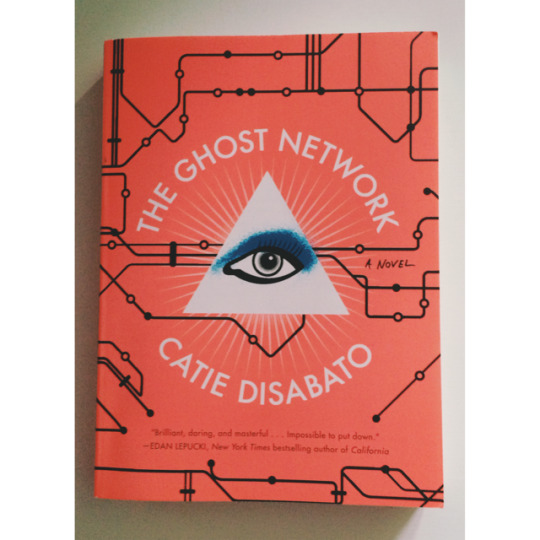
R E V I E W
One minute insanely famous pop singer Molly Metropolis is on her way to a major performance in Chicago, and the next, she’s gone.
A journalist who’s been covering Molly joins the singer’s personal assistant in an increasingly desperate search to find her, guided by a journal left behind in her hotel room, and possible clues hidden in her songs – all of which seem to point to an abandoned line in the Chicago subway system.
Warning: Spoilers
The problem I had with The Ghost Network is simple, I had very specific expectations before I started reading. When I first read the blurb I thought I was going to be reading a very fast-paced novel that was full of action. I thought the narrative would have a gritty quality and be full of suspense. The novel ended up both meeting and defying my expectations.
In terms of grit expectations were met. The story was the opposite of light-hearted; it was intense and unrelenting. The characters were always doing something to solve the mystery of Molly’s whereabouts. There’s a focus on boundaries too, in that all the characters completely lack them. This lends to some shocking scenes in the book, such as the cutting of Nix’s fingers. I ended up having to have a brief break from the book after that particular moment. Violence in this little microcosm is approached with frank brutality, a necessary tool to get to the truth. As is breaking and entering, theft, kidnapping… I would say the morals of the characters are questionable in their need to achieve.
The novel is structured like a mockumentary and reads very similar to an academic text. There is so much depth and detail to the whole mystery. And the novel does its best to ensure you understand the movement, with chapters dedicated to explaining and deciphering The Situationists. However, as necessary as the explanations are to the story I found they slowed the pace down. When reading about the original Situationist movement I was more interested in knowing how Taer, Nix and Berliner utilised this information as opposed to understanding it myself (I wasn’t really understanding it). These parts of the novel I did end up skim-reading a little.
Whilst, for me, these moments of definition disrupted and slowed the pacing of the novel they do contribute to the novel’s intellectual focus. The story didn’t read as fast-paced in action as I thought it would, but there is still a lot happening, though more so in the second half than in the first. I loved the second half of the novel, that’s when I struggled to put it down. So, despite mockumentary not being my favourite narrative style, The Ghost Network is an amazing read and is most definitely a book worth exploring.
4/5
1 note
·
View note
Photo
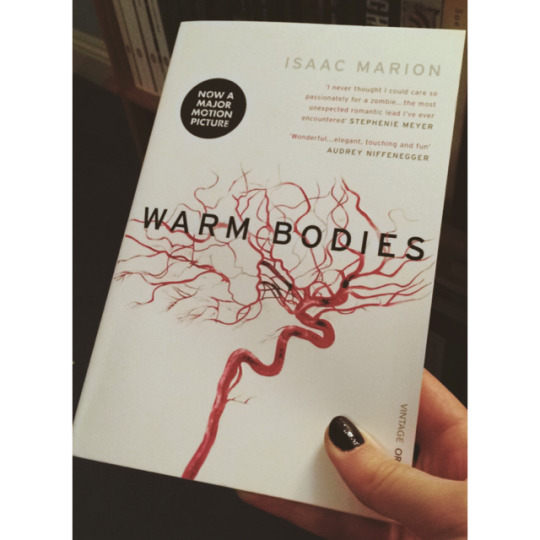
Just finished Warm Bodies. And I LOVED it!
Such a good book to start 2016 with.
1 note
·
View note
Text
The best part about train journeys?
The excuse to read for a solid couple hours.
2 notes
·
View notes
Text
I finished Confessions of an English Opium Eater!! So far my biggest accomplishment of the year. It was not an easy read.
#Confessions of an English Opium Eater#Thomas de Quincey#thoughts#it was interesting though#escapethroughthepages
2 notes
·
View notes
Text
4 days into 2015 and 2 books down on my reading challenge
pretty good start if I say so myself. 2015 may just possibly set a new record for books read... yes I know this is an early assumption to make
Feeling positive!
0 notes
Quote
You forget what you want to remember and you remember what you want to forget
Cormac McCarthy, The Road
1 note
·
View note
Text
blog update
Hi!
So I was taking a nice little browse around my blog (as you do) and I couldn't help but notice that everything was ever so slightly disorganised and chaotic. As in despite having tagged everything, I still had not made it easy to search for a specific post should the need or desire arise. So some overdue TLC and updating has been made and an actual system for the tags has been implemented! By clicking on 'blog navigation' in the sidebar you should, with any luck, be able to locate more specific posts in a quicker and more efficient manner.
I also alphabetised my book reviews, also under 'blog navigation', because who doesn't enjoy an alphabetisd list of book reviews? It looks pretty sparse right now with a lot of 'T' titles; something that will change.
Happy Reading :)
0 notes